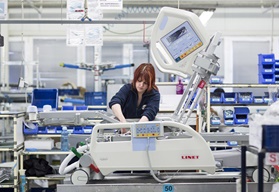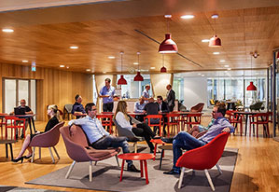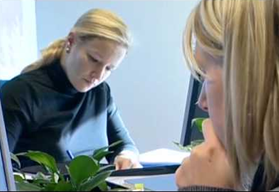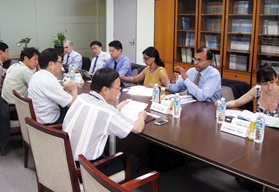OECD Observer Roundtable on local firms and automation
Roughly 14% of jobs in OECD countries are highly automatable, while another 32% will be transformed by automation. By 2019, it is estimated that 1.4 million new industrial robots will be installed in factories around the world. How can local firms and their workers adapt to this? How can policy help? On the occasion of the Forum, we asked our panel:
How have local firms and their workers been adapting to automation? How can policy help?
Lamia Kamal-Chaoui - Director of the OECD Centre for Entrepreneurship, SMEs, Regions and Cities
José António Vieira da Silva - Minister of Labour, Solidarity and Social Security, Portugal
Paola Pisano - Deputy Mayor for Innovation, City of Torino, Italy
Nicolas Hazard - Founder and president of INCO
Iris Arbel - Innovation Management Expert, Technion and Bar-Ilan universities, Israel
Sally Sinclair - CEO, National Employment Services Association (NESA), Australia
- Policy Director, Mowat Centre, University of Toronto
Success stories
Silly Yak Foods
Creative employment building opportunities for disadvantaged job seekers
Author: Sally Sinclair, CEO, National Employment Services Association
Melbourne-based handmade wheat, gluten and nut-free baked goods manufacturer Silly Yak Foods (“Silly Yaks”, because it’s food for “celiacs” – people suffering gluten intolerance) are a local success story, growing from a small café in 2001 to an international distributor of quality products.
As the business grew, their commitment to creating a supportive work environment grew with them. In 2013 they formed an exclusive partnership with the Australian employment services provider MatchWorks, whom they saw as sharing their commitment to getting disadvantaged people into secure, permanent, ongoing employment.
Silly Yak Foods’ commitment to inclusive employment has enabled disadvantaged job seekers to transform their lives. “The excellence in diversity recruitment shown by Silly Yak Foods shows that you don’t have to be a large employer to make a difference and contribute to addressing disadvantage,” said Sally Sinclair, CEO of the national Employment Services Association – peak body for the Australian employment services sector.
The company only has permanent employees. “By providing an open, inclusive, flexible and family friendly environment, as well as employing people only in permanent positions, we encourage a sense of belonging and community in our staff,” said Managing Director Bryn Pears.
Silly Yak looks at each potential employee as the person they are now, as well as what they can bring to the organisation moving forward. “Our staff recruitment process is largely indifferent to the applicant’s past travails, what matters is character and desire to work, not mistakes made earlier in life,” he said.
Barriers to employment can include characteristics of the job seeker, but more often they result from attitudes and structures that the job seeker must deal with in their search for employment. Pears has addressed those preconceptions directly, and in so doing has opened opportunities where traditionally there have been few. His decision was the right one: Silly Yak has a solid, loyal workforce with very low turnover - the motor behind a flourishing business.
Learn more: http://sillyyaks.com.au/
Gävleborg County
Working with young people at risk of exclusion in Gävleborg County
Gävleborg County has had the highest youth unemployment in Sweden for a long time. Today 15% of the county’s 16 to 24-year-olds are unemployed. In addition, there are a large number of young people who are neither in work, seeking work or studying.
An important explanation for this is that the county has the lowest educational level in the country. A culture that does not value education limits young people’s educational choices. The proportion of youth that do not graduate high school is among the highest in Sweden – with almost four out of ten young people not graduating. This is a serious issue as completed secondary education must be regarded as the key to work. Efforts to combat exclusion should also target this group.
Gävleborg is experiencing its greatest boom in modern times. There have never been so many vacancies registered at the employment office, and the proportion of employers who say they cannot secure the skills they need is the highest in the country. At the same time, Gävleborg has a large available labour force. This mismatch of the supply and demand of labour and skills is the largest in Sweden.
Gävleborg has initiated the Semaforen project, a system to meet the labour market’s competence requirements. The idea is to clarify what employers are looking for, to provide a good basis for designing initiatives and measures to minimise the shortage. From the outset, the idea was that if we only knew what employers lacked, education programmes could be developed to solve the problem. However, with hindsight, things are not this simple. Many much-needed courses are not implemented or are half empty due to low interest or appeal.
Development work done in Gävle municipality focuses on cooperation and initiatives to encourage young people to set goals and complete upper secondary school in the first place, instead of finding short-term or insecure work or just sitting at home.
One Stop Shop
The goal is to encourage collaboration between the Labour Market Unit, Social Services and the employment office to create local resistance to exclusion with the aim of reducing youth unemployment by raising education levels through coordinated efforts. Young people benefit from access to the right support from one place that is individually adapted, which offers increased opportunities for success to raise their level of education.
The work is divided into three parts – Development, Work and Studies – in order to best work with the individual and find meaningful activities. The work takes place in modules according to the individual’s journey from social exclusion through a return to study or a firm footing in the labour market.
Key concepts
There is no failure, everybody can always have a new opportunity, and everyone develops at their own pace. Gävleborg puts young people in focus and, based on their situation, creates adapted support and activities for each young person’s development, to get them into work through education.
Brightlands
Brightlands: Supporting regional industrial transition
Author: Dirk Plees, Province of Limburg (NL)
The present moment is one that will influence the future. Bright people and 'new kids on the block' are part of a fast growing, open innovation community. Brightlands take advantage of grand challenges to secure a sustainable future for all on our planet and generations to come. Brightlands is knowledge crossing borders and consists of four campuses embracing the following areas of expertise:
1. Smart materials and sustainable manufacturing (Brightlands Chemelot Campus, location Sittard-Geleen),
2. Regenerative medicine, precision medicine & innovative diagnostics (Brightlands Maastricht Health Campus, location Maastricht),
3. Data science and smart services (Brightlands Smart Services Campus, location Heerlen),
4. Food and nutrition (Brightlands Campus Greenport Venlo, location Venlo).
Governance
Brightlands is the brand name of a joint triple helix initiative of the Dutch province of Limburg, Maastricht University, Maastricht University Medical Center+, Zuyd University of Applied Sciences, Fontys International Campus Venlo, in close partnership with leading companies in specific market areas.
Ecosystem with state-of-the-art facilities
This public-private partnership works in an open innovation ecosystem that rapidly grows from four campuses in Maastricht, Sittard-Geleen, Heerlen and Venlo as home to state-of-the-art facilities, fundamental and applied research offered to scientists, entrepreneurs, students and investors. Together they create new chances and solutions in sustainability and health that are environmentally sound, business wise and socially positive.
Support and management
All Brightlands campuses are proudly supported by the Province of Limburg, Maastricht University, the Dutch Ministry of Economic Affairs, private companies, as well as several European, national and local public funds. The campuses are managed jointly by leadership teams of member partners who administer their respective campus bodies.
The Brightlands ecosystem is there to accelerate innovation. For instance, by helping you start or grow your business, to develop or connect with talent, or to host your event. Brightlands offers easy access to state-of-the-art (R&D) facilities, to pilot areas, talent, investors, knowledge and international business and science networks.
Learn more: www.brightlands.com
Limburg@Work
Job market plan: ‘This is Limburg AT WORK’
Author: Dirk Plees, Province of Limburg (NL)
More people in work, sustainable immigration, lifelong learning, the right example and collective awareness: these are the key concepts in ‘This is Limburg at WORK’, the Provincial Government’s plan to improve the way Limburg’s job market operates. The plan requires broad cooperation and asks employers, employees, educational institutions, civil society organisations and the authorities to share responsibility.
Growth means challenges
Limburg’s economy is flourishing and boosting employment, with no less than 20,000 new jobs expected over the next two years. Nevertheless, more than 94,000 Limburg residents are still unemployed. Resolving the mismatch between labour supply and demand in the short term is one of the main aims of the plan. The Provincial Government has also considered the longer term, with the expectation that digitalisation and robotisation will lead to job losses or permanently change the nature of many jobs. These changes risk a gap opening up between those who have marketable skills and those who do not.
Five Action Lines
‘This is Limburg AT WORK!’ is divided into five Action Lines that illustrate the breadth of the Province’s approach.
1. Awareness: It is important to ensure that everyone involved in Limburg’s job market is aware of the task that we face. The Province is developing a communication strategy that uses storytelling to explain existing economic opportunities, the new requirements that employees and job-seekers in Limburg must meet to take advantage of them, and the steps that we and all other stakeholders are taking in that regard.
2. Employment participation for all in Limburg: The aim is to make work possible for everyone. For example, the Province intends to continue its ‘Limburg Approach’, in which it encourages businesses to hire benefit recipients, in the health care and logistics sectors. The approach has already proved successful at automobile manufacturer VDL Nedcar in Born and the ‘Beej Benders’ food hall in Venlo. The Province will also roll out the Limburg Building Sector Agreement and work with the Central Limburg labour market region to help the inactive unemployed find suitable work.
3. Here to stay- housing, work and lifestyle for New Limburgers: To support the smooth operation of the job market and maintain economic growth and social progress, Limburg must be able to attract and deploy permit holders (i.e. persons granted asylum) and individuals who have relocated for work. The Province is therefore setting up action and expertise teams that will help permit holders acquire a work permit on top of their residence permit, giving them a permanent spot in the job market. It is also creating flexible housing so that recent arrivals and others who urgently require housing can find suitable accommodation without delay.
4. Long-life learning: ‘This is Limburg AT WORK!’ charges the education sector with an important task. Lifelong learning is crucial to maintaining a labour supply that matches job market demand. To achieve this, Limburg is making agreements with all stakeholders about personalised learning, as referenced in the new Government Coalition Agreement. We are also exploring the possibility of setting up a Career Development Centre, a virtual community for job-seekers in this region.
5. The right example: The Province of Limburg is not only the plan’s driver, but also a funding body, a client and an employer. In each of these roles, the Province adds value to the regional job market. Focus will be on social return of investment, with job creation, traineeships and training as the main elements.
Turku Vocational Institute
Making vocational education more attractive and flexible
Author: Anu Parantainen, Head of the Planning and Development Unit in the Education Division of the City of Turku, Finland
The economic situation in Turku, and in all of South-West of Finland, has changed dramatically over the last two years. The next five years will see an increase in the need for employees from 15 000 to 30 000. Because of this positive change, the number of unemployed people is decreasing: now at 9,9%down from 12,2% in 2017.
To sustain the work force, vocational institutes in South-West Finland have campaigned for students to enter technical fields (“Make vocational education more attractive”). These campaigns are targeted at young people and the results are extremely good – the number of students has increased with fewer drop-outs. In 2016 there were 41,6% more students in metal work than in 2015, and in 2017 42% more. Drop-outs have fallen from 19%, to 5%.
Companies have been involved in this strategy. With VET organizations they have built new learning environments both in schools and businesses. Teachers and employers plan together the content of education and training sessions, and excursions to companies take place at all school levels.
Changes in work and employer demands force VET organizations to be more flexible. Employees are needed faster, but there is also a demand for multiprofessional skills.
In the beginning of 2018, the Turku Vocational Institute began a project to develop a model for a 365/12 vocational college that never sleeps – an institution where studying and learning can happen regardless of time and place. The model is characterised by speed, quality, and agility.
The spearheads of the 365/12 -project are
- collaboration between businesses and education providers as a source for new innovation and business ideas
- entrepreneurship as an integral part of studies
- multivocational study paths created according to working needs
- virtual and digital studies as part of the learning process
- Centres of Expertise for guidance and teaching
- improving guidance for on-the-job learning periods using digital tools
Learn more: www.turkuai.fi/en/turku-vocational-institute
Korea Labor Institute
Korea Labor Institute collaboration with municipalities for local employment policies
Authors: Yoon-Gyu Yoon and Dongwoo Kang, Researchers at the Center for Regional Employment Studies, Korea Labor Institute
The Korea Labor Institute (hereafter, KLI) is a government-funded research institute focusing on labor and employment issues. The research scope of KLI is not limited to national level labor and employment issues, but also includes quantitative and qualitative studies analyzing local labor markets and consulting local municipalities for making better place-based employment policies.
In 2016, KLI consulted Jeju province on ‘Basic Employment Policy Plans for Jeju’. In Korea, municipalities make their own basic employment policy plans every 5 year and the governor of Jeju requested KLI to research their basic plans. In order to provide a framework for new basic employment policy plans, KLI studied Jeju province’s local labor market, the level of skills, the vocational training system and delivery of employment services, and industrial bases. KLI also collaborated with local researchers in Jeju to understand the governance organization of labor and employment policies. Based on this multidisciplinary research, KLI proposed a framework for Jeju’s basic employment policy plan which the province implemented.
In 2017, KLI collaborated with Busan Metropolitan City, famous for its beautiful beach, the Asia International Film Festival, and the G-STAR Global Game Exhibition. Building on this momentum, Busan is hoping to boost more and better job creation in tourism and entertainment industries. Busan requested KLI research job creation in tourism, movies, electronic games, and animation. KLI analyzed the sectors’ current situations and labor market conditions and held an international seminar with policy makers, researchers and cartoonists. In addition, KLI and Busan invited Mr. Jonathan Barr (OECD), to share lessons from relevant OECD cases on creating jobs in tourism and entertainment. The city of Busan has implemented several of these suggestions.
Learn more: www.kli.re.kr/kli_eng/index.do











